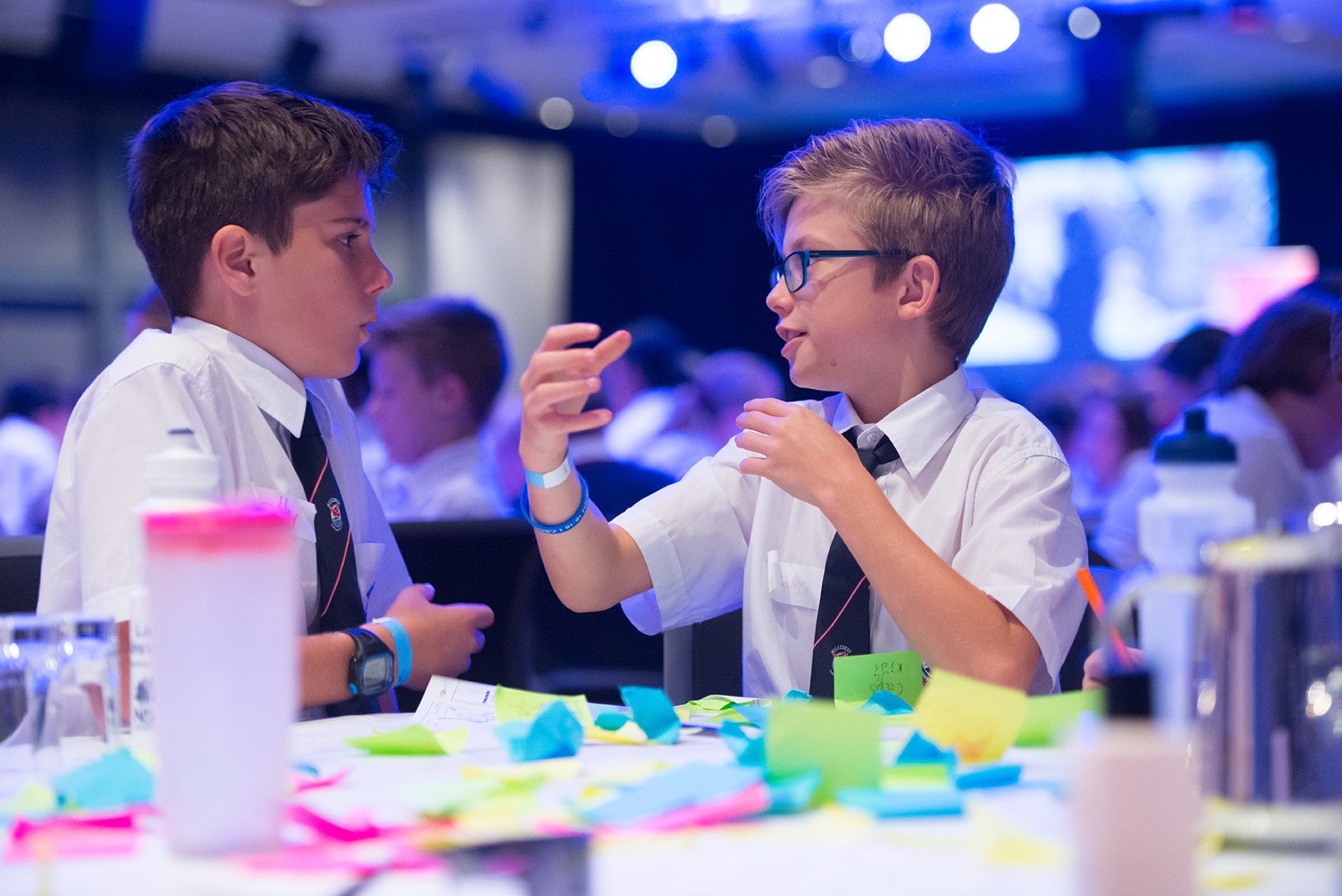
Thinking like an entrepreneur.
by Nicole Dyson, Founder & CEO, Future Anything
The world of work is changing.
The average twelve-year-old today will have seventeen different jobs across five different industries in their lifetime (McCrindle 2015).
For the first time in history, employers are listing more enterprise skills than technical skills in job advertisements (FYA 2016). As a result, the demand is increasing exponentially for critical thinking (+170%), creativity (+62%), presentation skills (+24%) and teamwork (+20%), and yet research indicates that over 1/3 of young people are not proficient in these areas (FYA 2016).
It’s no wonder that schools are lunging towards entrepreneurship, STEM, design thinking and inquiry pedagogies in their haste to bridge the gap between what we teach, and what young people need.
However, it’s important to note that we don’t need a generation of entrepreneurs.
We need young people who have an adaptive mindset and see feedback as fuel to get better.
We need young people that are confident communicators and can convey their thinking in a compelling way.
We need young people that can identify problems in front of them, and rather than stare apathetically at them until someone else solves them, can use creativity, innovation and their initiative to propose authentic solutions.
In short, what we need is a generation of young people that are capable of thinking like an entrepreneur in their approach to learning and to life.
The reality of entrepreneurial education today
The reality is that most entrepreneurial education currently fits within three categories:
- Incursion workshops run by external facilitators. Some delivered by qualified educators, others not. Certainly, these are valuable and they’re great for energy and ‘new’, but when the fun and friendly facilitator leaves the room, so does the knowledge and momentum.
- Elective subjects run by a school’s Business faculty. Led by a school’s teaching team, these can be fantastic, but the reality is that they often focus on the ‘mechanics’ of business. More importantly, they only cater to those students already interested enough in business and entrepreneurship to choose the elective in the first place.
- Selective entry extra-curricular or co-curricular programs that are made available to the fortunate few (who are often, paradoxically, not to those who will most benefit from a capability-focused, ‘real world’ model).
Sure, these approaches can unveil pockets of greatness or enable an already-entrepreneurial outlier to emerge, but can they really generate genuine transformative change within the fabric of a school’s pedagogical approach to future-ready teaching and learning?
Do they genuinely seed, develop and embed the explicit capacity building of the critical skills that our young people, and employers, will so desperately need?
I’m not so sure.
Thinking like an entrepreneur
My mission, through Future Anything, has always been to address one this critical provocation:
“How do we support schools to create an equitable approach to entrepreneurial pedagogy that empowers educators and all young people to develop the skills and capabilities so they are thinking like an entrepreneur in their approach to learning and life?”
It is this provocation that underpins our in-curriculum program, Activate. Whilst we build some fantastic enterprises as a result of the program, our focus is on delivering this through three critical components:
- Face-to-face capacity building of each school’s teaching teams to deliver engaging and relevant learning experiences in their everyday classrooms. This puts classroom teachers in the driver’s seat- with us as navigators and guides.
- Provision of a fully resourced curriculum that is engaging, differentiated, and explicitly linked to Australian Curriculum Achievement Standards. This enables teachers to focus on teaching and learning, rather than resource development.
- Post-program opportunities for interested students to access the funding and industry connections to launch their ideas out of the classroom and into the real world. This means that the learning doesn’t have to stop when the assignment is handed in.
We’ve recently launched Activate 2022, our curriculum-aligned applied entrepreneurship program and there are two things about it that really excite me.
Firstly, while Business Enterprise subjects remain at the core, Activate is now available in ten subject streams including English, STEM, Science, Civics and Citizenship and for the first time, Health & Physical Education through two new streams – Sport and Wellbeing.
Through carefully designed driving questions, curriculum content and lesson plans differentiated for Years 7 to 10, educators outside the traditional business enterprise ‘silo’ will be supported to embed the future capabilities that build entrepreneurial mindsets in all their students.
In this way, Activate can be embedded in multiple subjects and year levels, building an integrated, whole-school approach to entrepreneurial education that is supportive of teachers.
Secondly, we’ve really wrestled with the question of “How do we know it works?”.
It’s all good and well to say that Activate builds the capacity of young people to ‘think’ like an entrepreneur, but how do we measure that? As impressive as participation numbers can look on paper, they don’t necessarily translate to impact.
In my recent blog Knowledge is not power. Skills and capabilities are, I explained how Activate focuses on building the capacity of our young people in the following six key future capabilities:
- Communication
- Collaboration
- Critical Thinking
- Problem Solving
- Innovation/ Creativity
- Adaptive Mindset
One of the ways that we do this is through pre-and post-testing students on their understanding of their own proficiency and confidence in each of these six skills. You can check out our surveys here (PDF).
These pre-and post-program surveys are critical for two reasons. The first is to measure movement from start to finish. If you don’t collect the data, how do you know what you’re doing is working?
Secondly, by defining the skills and having students reflect on their own understanding early, we’re front-loading the importance of the skills from the outset of the unit.
And, as our 2021 cohort of schools begin to wrap the Activate for the year, we’ve finally got the answer to the question, “How do we know it works?”
We’ve seen increases in students’ confidence levels in all six of our core future capabilities following the completion of the Activate program:
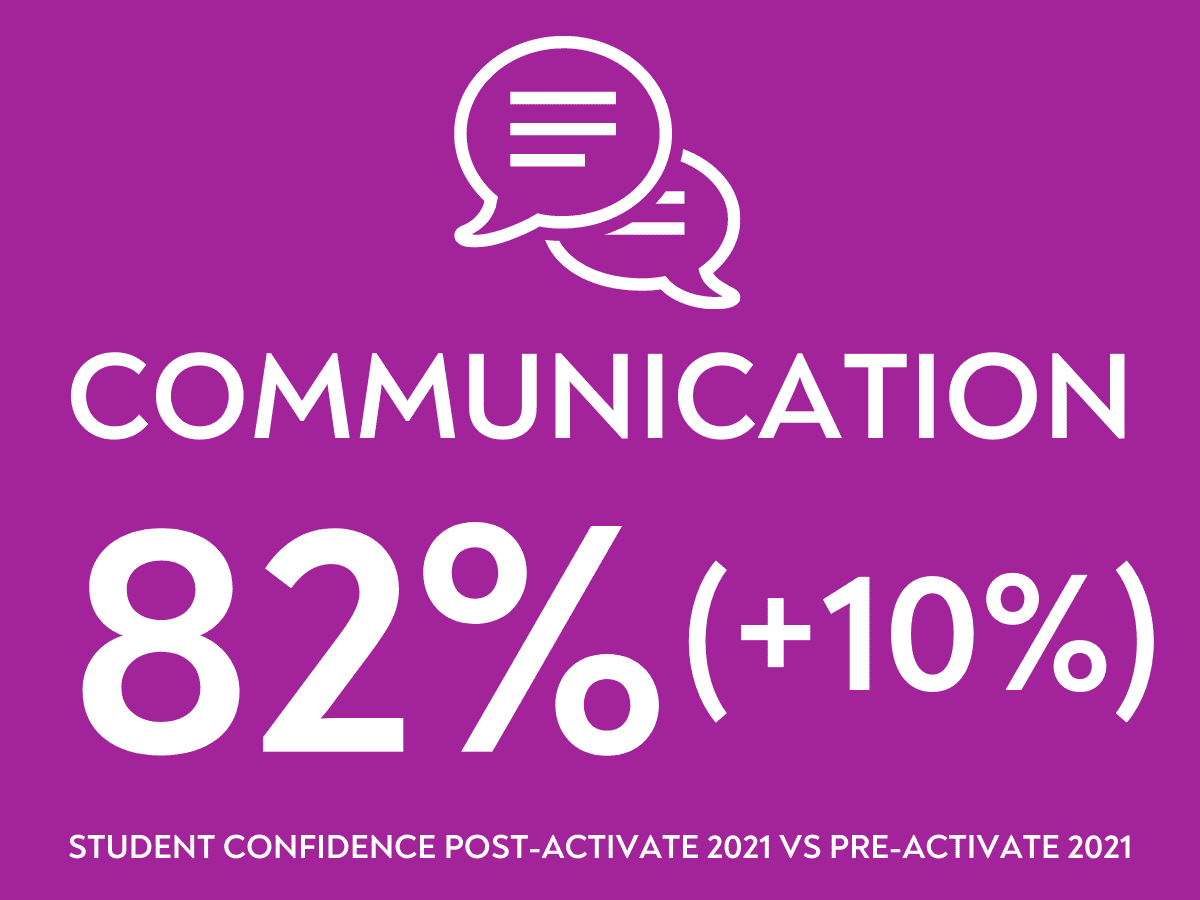
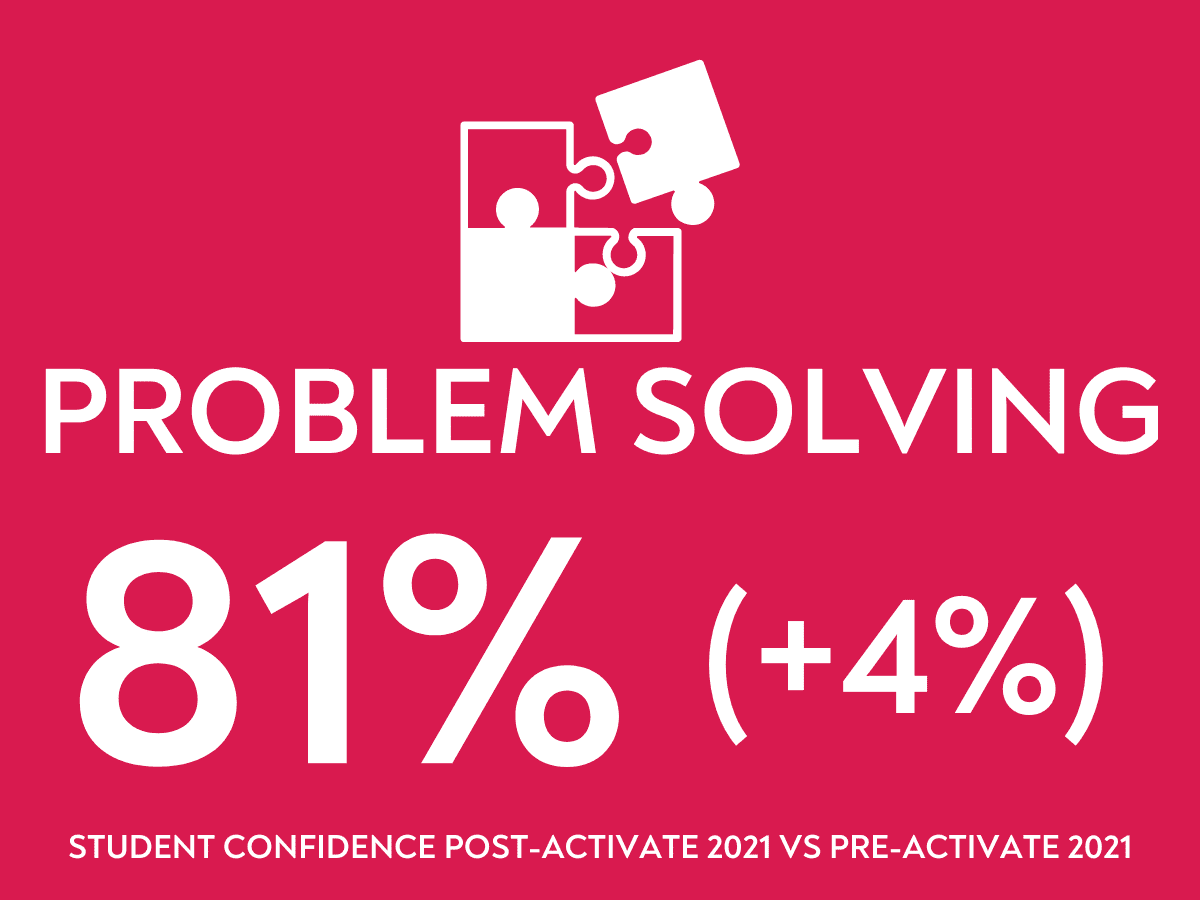
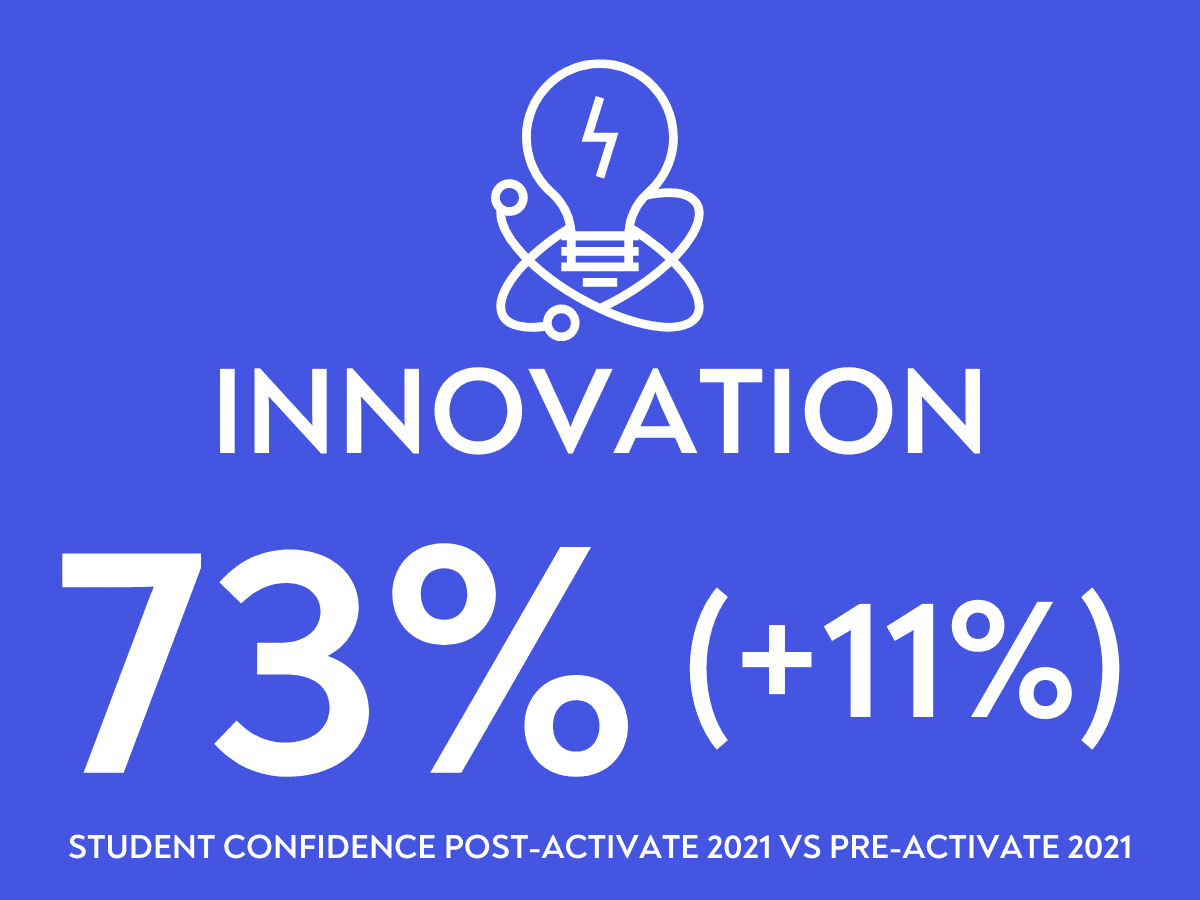
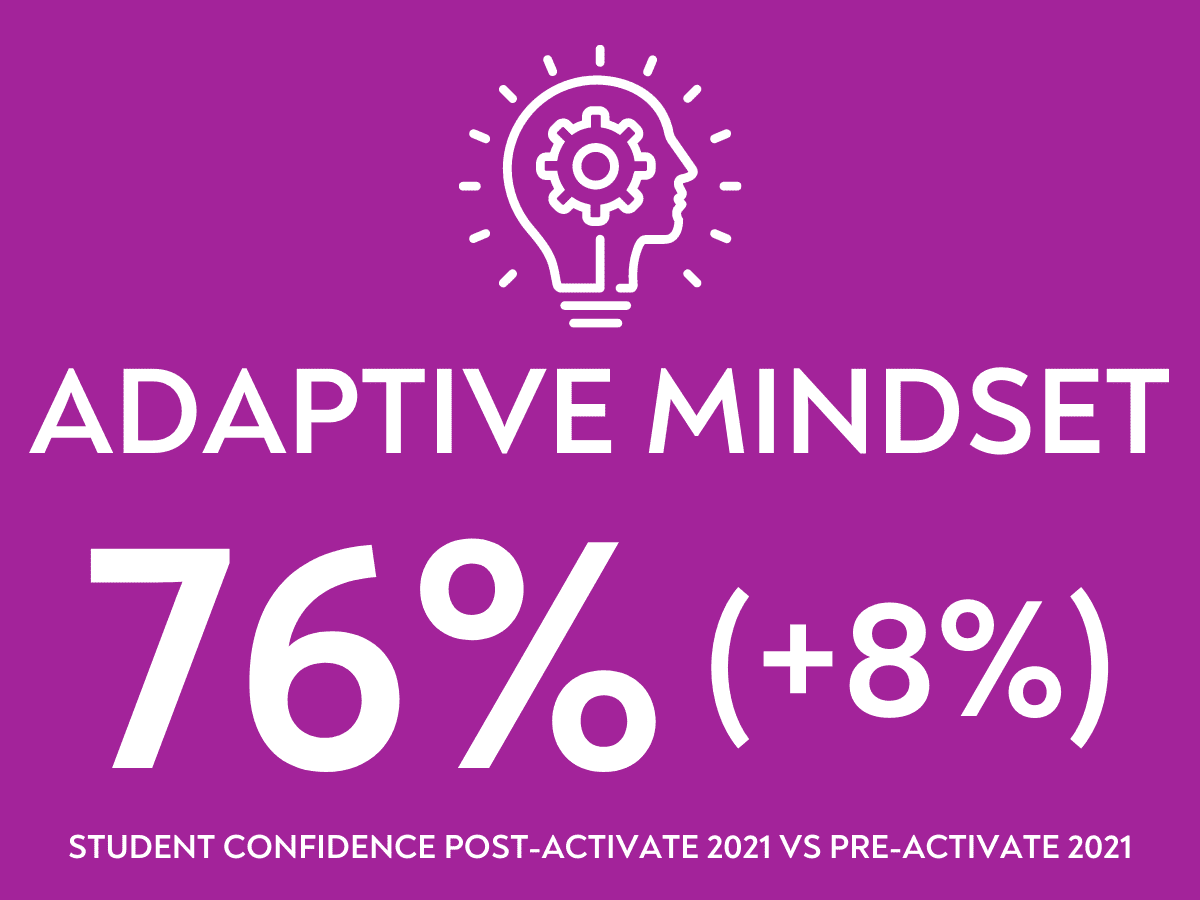
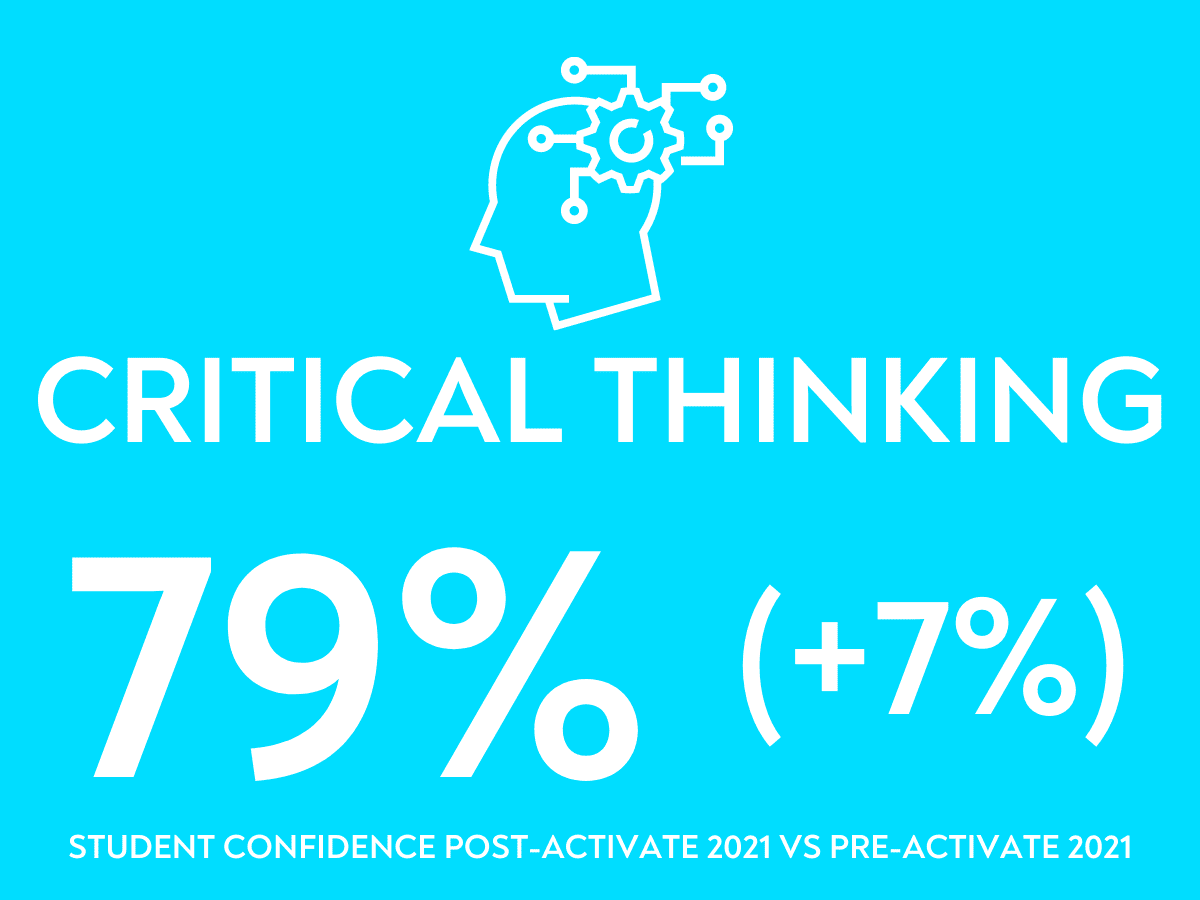

Thriving in the future of work
We recently opened registrations for Activate 2022, and in two short weeks have already amassed registrations for almost 2,000 young people in schools around Australia- a pretty incredible feat.
It’s ambitious, but we’d love to see 10,000 students and their teachers engaged in a future-ready curriculum that enables teachers and students to think like an entrepreneur.
With those kinds of numbers, together, we’ll be taking the first step towards creating a generation of young people who implicitly capable of thinking like an entrepreneur, and who can apply those future capabilities to whatever they choose to do.
I’m so looking forward to working with the brilliant educators in all our Activate 2022 schools, empowering them to prepare their young people not just to do seventeen jobs in five different industries, but to thrive in those jobs.
Interested in bringing Activate 2022 to your school? Click here to download the brochure (includes registration and pricing info).
Subscribe to Future Anything’s regular e-newsletter to have resources delivered right to your inbox. You can sign up here.
About the author: Nicole Dyson
As a teacher in the USA, UK and Australia as well as a Head of Department and Head of Year at some of Queensland’s top-performing public schools, Nicole has repeatedly led the design and implementation of whole-school changes to support future ready learning; placing young people at the forefront of co-designing contextually relevant learning experiences.

Nicole is an engaging and skilled facilitator, panellist and speaker who is a passionate advocate for equity, the future of education, and empowering young people to bend the future; one youth-led idea at a time.
Connect with Nic on LinkedIn here or Twitter here.





